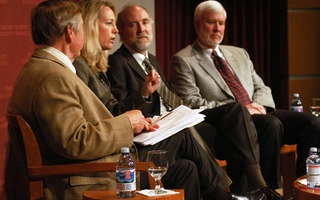The recent disaster at the Fukushima Nuclear Power Plant in Japan is a “decision moment” for the nuclear power community, according to Associate Professor of Public Policy at Kennedy School of Government Matthew Bunn in a talk yesterday titled “Chernobyl, Fukushima, and the Future of Nuclear Energy.”
Bunn delivered his talk as part of a day-long lecture series that took a retrospective look at Chernobyl and the current status of nuclear power on the 25th anniversary of the devastating nuclear disaster.
Bunn, whose research focuses on nuclear proliferation and international nuclear policy, explored the nuclear landscape after the earthquake and tsunami that led to releases of radioactive materials at Fukushima that began in March and urged for more stringent safety standards and a process of international review for nuclear reactors.
“The event was especially relevant in light of the recent disaster in Japan,” said Cris L. Martin, outreach director at the Davis Center for Russian and Eurasian Studies, which hosted the event.
“We had four very knowledgeable and engaging speakers that understood the significance of the anniversary of Chernobyl in current events,” she said.
Lectures were given on the history, ecological consequences, and political impact of the Chernobyl disaster.
Bunn’s talk focused on nuclear power in the 21st century, and he specifically discussed technical details of the Fukushima disaster and ways in which such disasters can be avoided in the future.
“What will come out of Fukushima? I’m hoping it has shown us that we need to address issues of safety and security in the nuclear power community moving forward,” Bunn said.
The recent disaster in Japan has clear parallels to that of Chernobyl 25 years ago, which badly damaged public confidence in nuclear energy and severely slowed the rate of construction of nuclear reactors in the year following the disaster.
Bunn predicted that nuclear energy will be a tough sell in the United States in the coming years.
Citing economic factors, such as cheap energy in the absence of a carbon tax and low prices of natural gas, Bunn said he wasn’t optimistic about the odds of a substantial number of new reactors being constructed in the States.
“Fukushima makes the prospect of using nuclear energy even less attractive,” Bunn added.
And while Bunn expressed hope that lessons will be gleaned from the recent disaster, he said the outlook isn’t rosy.
“We’re already seeing a falling-off of concern. It’s unfortunate.”
Read more in News
LS1b Staff Investigates Cheating on FacebookRecommended Articles
-
 IOP Panel Discusses Nuclear Weapons
IOP Panel Discusses Nuclear Weapons -
Experts Look at Nuclear Power After FukushimaNuclear security experts from the Harvard Kennedy School’s Belfer Center say that the disaster in the Fukushima power plant will not necessarily constrain the growth of the nuclear power industry, especially where the demand for more energy is high.
-
Facts of the WeekOn March 11, an earthquake and tsunami struck japan, devastating the region.
-
Nuclear Power's Dirty LegacyEven if the government finds a big pit where we can chuck all of the nation's waste, the danger doesn't go away on any human timescale. While some radioactive substances, such as those used in medical imaging, break down in a matter of hours, the spent fuel rods from nuclear reactors will still be dangerous thousands upon thousands of years from now.
-
 Nuclear Cambridge
Nuclear Cambridge -
Kennedy School Names IMF Head As Commencement SpeakerManaging Director of the International Monetary Fund Christine Lagarde will deliver the commencement address to this year’s class of Harvard Kennedy School graduates.













